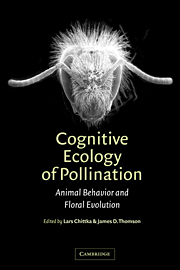Book contents
- Frontmatter
- Contents
- List of contributors
- Preface
- 1 The effect of variation among floral traits on the flower constancy of pollinators
- 2 Behavioral and neural mechanisms of learning and memory as determinants of flower constancy
- 3 Subjective evaluation and choice behavior by nectar-and pollen-collecting bees
- 4 Honeybee vision and floral displays:from detection to close-up recognition
- 5 Floral scent, olfaction, and scent-driven foraging behavior
- 6 Adaptation, constraint, and chance in the evolution of flower color and pollinator color vision
- 7 Foraging and spatial learning in hummingbirds
- 8 Bats as pollinators: foraging energetics and floral adaptations
- 9 Vision and learning in some neglected pollinators: beetles, flies, moths, and butterflies
- 10 Pollinator individuality: when does it matter?
- 11 Effects of predation risk on pollinators and plants
- 12 Pollinator preference, frequency dependence, and floral evolution
- 13 Pollinator-mediated assortative mating: causes and consequences
- 14 Behavioural responses of pollinators to variation in floral display size and their influences on the evolution of floral traits
- 15 The effects of floral design and display on pollinator economics and pollen dispersal
- 16 Pollinator behavior and plant speciation: looking beyond the “ethological isolation” paradigm
- Index
Preface
Published online by Cambridge University Press: 13 August 2009
- Frontmatter
- Contents
- List of contributors
- Preface
- 1 The effect of variation among floral traits on the flower constancy of pollinators
- 2 Behavioral and neural mechanisms of learning and memory as determinants of flower constancy
- 3 Subjective evaluation and choice behavior by nectar-and pollen-collecting bees
- 4 Honeybee vision and floral displays:from detection to close-up recognition
- 5 Floral scent, olfaction, and scent-driven foraging behavior
- 6 Adaptation, constraint, and chance in the evolution of flower color and pollinator color vision
- 7 Foraging and spatial learning in hummingbirds
- 8 Bats as pollinators: foraging energetics and floral adaptations
- 9 Vision and learning in some neglected pollinators: beetles, flies, moths, and butterflies
- 10 Pollinator individuality: when does it matter?
- 11 Effects of predation risk on pollinators and plants
- 12 Pollinator preference, frequency dependence, and floral evolution
- 13 Pollinator-mediated assortative mating: causes and consequences
- 14 Behavioural responses of pollinators to variation in floral display size and their influences on the evolution of floral traits
- 15 The effects of floral design and display on pollinator economics and pollen dispersal
- 16 Pollinator behavior and plant speciation: looking beyond the “ethological isolation” paradigm
- Index
Summary
The idea of making this book arose from a symposium at the XVI International Botanical Congress in St. Louis, USA in August 1999, which brought together some of the contributors of this book. The idea, then, was to inform botanists of important recent developments in pollinator behavior, cognition, and sensory biology. These new findings and perspectives have numerous implications for the evolution of plants and the shaping of plant community structure. Our rationale for such a symposium was that we thought that many botanists are hard-pressed to keep up with the literature concerning pollinator neuroethology and behavioral ecology. Therefore, the field of plant–pollinator interactions is somewhat hobbled by stereotyped, anachronistic, scale-limited, or just simplistic views of how animals really interact with flowering plants.
Our discussions during the symposium (and with other contributors outside the symposium), however, revealed much more profound gaps than just the one between botanists and zoologists. Pollination biology is poised at the boundary between two different traditions, those of proximate and ultimate reasoning in biology. On the one hand, evolutionary ecologists tend to seek adaptive explanations for biological characters – how do the observed traits benefit the animal or plant? Physiologists and neuroethologists, on the other hand, prefer to consider the mechanisms by which environmental stimuli provoke or modify behavior. Unfortunately, these two groups of scientists have little commerce; they publish in different journals, attend different conferences, and tend to disparage each other's views. This was how the biological world was divided until a few years ago.
- Type
- Chapter
- Information
- Cognitive Ecology of PollinationAnimal Behaviour and Floral Evolution, pp. x - xivPublisher: Cambridge University PressPrint publication year: 2001



